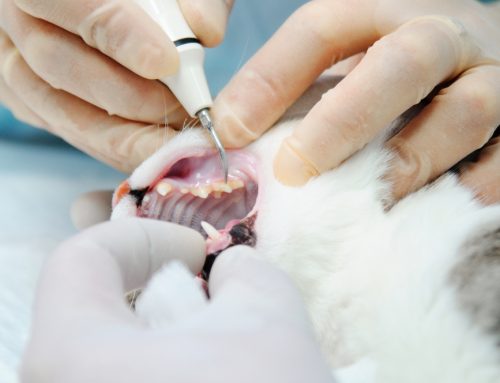You may think you understand all about heartworm disease after hearing our veterinary team recommend prevention for the umpteenth time. But many myths circulate about this deadly parasite. In fact, misconceptions may be partly to blame for more than 1,800 cases of heartworm disease diagnosed in Connecticut pets last year. At Bolton Vet, we diagnose about 20 new cases of heartworm disease each year. So that your pet does not become a statistic, this article separates fact from fiction, and clears up common myths about heartworm disease in pets.
Myth #1: My pet never goes outside, so they cannot get heartworm disease
Reality: Heartworms are transmitted by mosquitoes, which are most likely to bite your pet outside. However, flying insects can easily slip through an open door, torn window screen, attic soffit, or exhaust vent. If you have ever had a fly buzzing around the kitchen, or awakened with a new mosquito bite, you know how adept insects are at finding their way inside your home. Plus, your indoor cat or dog may slip outside, and become a mosquito’s next meal. All cats and dogs are at risk for heartworm infection, whether or not they routinely spend time outside.
Myth #2: My pet’s fecal test was negative, so they are heartworm-free
Reality: While most internal parasites, such as intestinal worms, Giardia, and coccidia, reside in a pet’s gastrointestinal tract, heartworms live up to their name and head right for your pet’s most important organ. After larval worms, called microfilariae, are transmitted by a mosquito bite, they travel through a pet’s tissues to their heart and lung vessels. After a six-month maturation period, the worms replicate and produce the next generation of microfilariae, which circulate in the pet’s blood.
Since heartworms live in the heart and blood vessels, your pet’s fecal test will not detect their presence. Instead, heartworm disease is diagnosed with a blood test that detects proteins produced by adult female worms.
Myth #3: My neighbor’s dog is heartworm positive, and may have infected my dog
Reality: Heartworms cannot be passed directly from one pet to another. Microfilariae circulating in an infected animal’s bloodstream must be picked up during a blood meal and complete a required developmental stage inside the mosquito before being passed to another dog.
While your pet cannot become infected by a neighbor’s dog, having an infected animal in your neighborhood makes it more likely that local mosquitoes are carrying heartworm larvae that may be passed to your pet.
Myth #4: My pet needs heartworm protection during warm months only
Reality: While it is true mosquitoes are inactive when temperatures dip below 50 degrees, unpredictable weather patterns make rogue, middle-of-the winter mosquitoes increasingly common. Mosquitoes buzz back into the picture whenever the temperature rises above 50 degrees, which means year-round prevention is the best way to ensure your furry family member is fully protected.
Myth #5: My cat cannot get heartworm disease, and does not need protection
Reality: Dogs, including wild dogs such as wolves and coyotes, are the heartworm’s preferred host, but cats and ferrets can also become infected. Cats and ferrets are considered atypical hosts—larval heartworms transmitted by mosquitoes can develop to adults, but cannot reproduce. Unfortunately, only a few worms can lead to heartworm-associated respiratory disease (HARD), which causes significant lung inflammation in cats.
Treatment is available for heartworm-positive dogs—albeit lengthy, costly, and hard on a dog’s body—but no approved treatment is available to eliminate infections in cats or ferrets. Instead, supportive treatment focuses on reducing inflammation caused by the worms.
Myth #6: My pet’s skipped heartworm preventive dose is no big deal
Reality: Unlike other parasite preventives, which repel or kill adult parasites, heartworm preventives work retroactively to eliminate larval worms that have entered your pet’s body in the past month. But once larval heartworms reach a certain developmental stage, the preventive medications no longer kill them. For example, if you give your pet a heartworm preventive on day 1, it will kill any larval worms that may have been passed by mosquitoes in the past month, but does not have any residual effect to eliminate heartworm larvae that may be transmitted in the future. Now let’s assume your pet is bitten by an infected mosquito on day 7, and larval worms enter their body and begin to mature. Your pet is due for their next preventive on day 31, but you forget. When you give the next dose, on day 61, the larvae have now grown for seven weeks, and are no longer susceptible to the medication. One skipped dose can mean the difference between a clean bill of health and a deadly infection.
Myth #7: My pet would act sick if they had heartworm disease

Reality: Heartworm disease signs do not typically develop in dogs until enough worms accumulate to obstruct blood flow and cause heart failure. After infection, it takes six months for heartworm larvae to mature, and many more months for subsequent generations to mature and accumulate. In other words, your pet can have a silent infection for one year, or longer, before they become symptomatic. At that point, their infection has advanced, and treatment will be harder on them.
In cats, HARD does not typically develop until the few worms transmitted mature to adulthood, and many cats never become symptomatic. Unfortunately, sudden death is sometimes the first sign a cat has heartworm disease.
Because infection is often not obvious, annual heartworm testing is critical for all dogs and cats. Regular testing can detect an infection before irreversible heart and lung damage develops, and when treatment may not be as difficult for your dog to endure.
Is your dog or cat overdue for their annual heartworm test or prevention refill? Give our Bolton Veterinary Hospital team a call to schedule this important appointment.







Leave A Comment